Politics
Hot mic picks up Putin and Xi discussing organ transplants and immortality
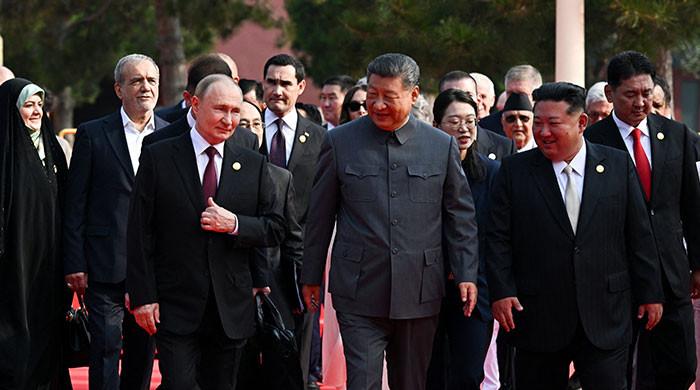
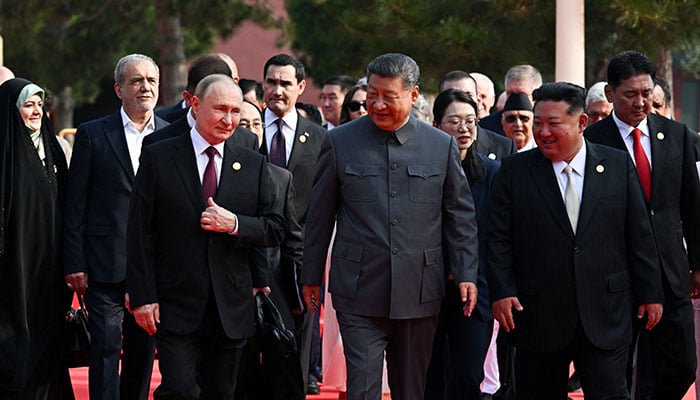
BEIJING: When Russian President Vladimir Putin walked shoulder to shoulder with Chinese President Xi Jinping on Wednesday, a hot mic caught them discussing organ transplants and the possibility that humans could live to 150 years old.
The moment came as Putin and Xi walked with North Korea’s Kim Jong Un at the head of a delegation of more than two dozen foreign leaders to view a military parade in Beijing marking the 80th anniversary of the end of World War Two.
The moment was carried on the livestream provided by state broadcaster CCTV to other media, including AP and Reuters. China’s radio and TV administration said CCTV’s coverage of the event was viewed 1.9 billion times online and by more than 400 million on TV.
As Putin and Xi walked toward the Tiananmen rostrum where they viewed the parade with Kim, Putin’s translator could be heard saying in Chinese: “Biotechnology is continuously developing.”
The translator added, after an inaudible passage: “Human organs can be continuously transplanted. The longer you live, the younger you become, and (you can) even achieve immortality.”
In response, Xi, who was off camera, can be heard responding in Chinese: “Some predict that in this century humans may live to 150 years old.”
Kim was smiling and looking in the direction of Putin and Xi, but it was not clear if the conversation was being translated for him. Putin cannot be heard speaking clearly in Russian in the CCTV clip.
Putin confirmed later that he and Xi had discussed the subject on Wednesday.
“I think when we went to the parade, the chairman talked about it,” Putin told reporters in Beijing when asked about the leaked conversation.
“Modern means of health improvement, medical means, even surgical ones related to organ replacement, they allow humanity to hope that active life will continue differently than it does today,” he said.
China’s Ministry of Foreign Affairs and CCTV did not immediately respond to requests from Reuters for comment.
As Xi began speaking, the video cut to a wide shot of Tiananmen Square and the audio faded.
Just over 30 seconds later, Xi, Putin and Kim reappeared on camera as they walked on the steps toward the viewing platform for the parade.
At the event, Xi told a crowd of more than 50,000 spectators the world faced a choice of “peace or war” as he inspected troops and cutting-edge military equipment, including hypersonic missiles and naval drones.
Putin arrived in China on Sunday to attend a summit organised by Beijing that convened more than 20 leaders of non-Western countries, including Indian Prime Minister Narendra Modi.
Putin and Xi signed more than 20 agreements on subjects ranging from energy to artificial intelligence, and agreed to build a major new gas pipeline, without announcing key details on financing or the pricing of the gas to be sent to China.
Politics
Migrant boat capsizes off Senegal, leaving at least 12 dead


- Boat carrying around 100 people capsizes near Mbour.
- 32 survivors reported, others flee before rescuers arrive.
- President Faye offers condolences, search for survivors continues.
At least 12 people died on Wednesday after a boat filled with migrants seeking to reach Europe sank off the coast of Senegal, security sources said.
The coastal west African country is one of the main departure points for the thousands of Africans who for years have been taking the perilous Atlantic route to reach Europe, primarily via the Spanish Canary Islands, aboard overcrowded and often dilapidated boats.
The latest sinking came in the waters off the town of Mbour when a boat loaded with around 100 people capsized, a security source told AFP on condition of anonymity.
“Twelve bodies were retrieved,” the source said.
A second security source confirmed the toll to AFP.
“There were 32 survivors. The others probably fled” before rescue services arrived on the scene, one source told AFP.
President Bassirou Diomaye Faye expressed condolences to the families of the victims in a social media post on Wednesday.
“We share their sorrow and their pain while the search continues to find any survivors,” he said.
On Tuesday, police intercepted 123 migrants aboard a boat in Senegal’s Thies region.
Politics
Zelensky reveals US-Ukraine plan to end Russian war, key questions remain
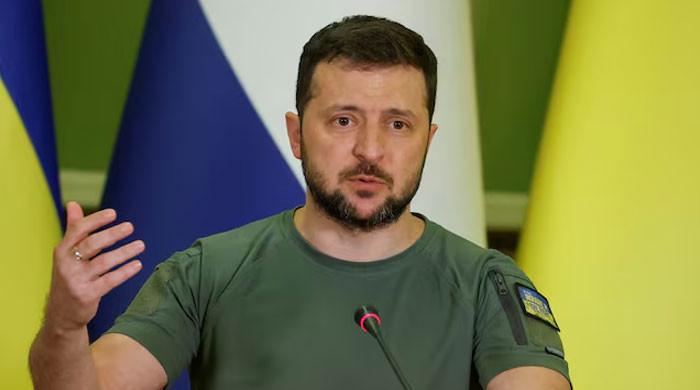
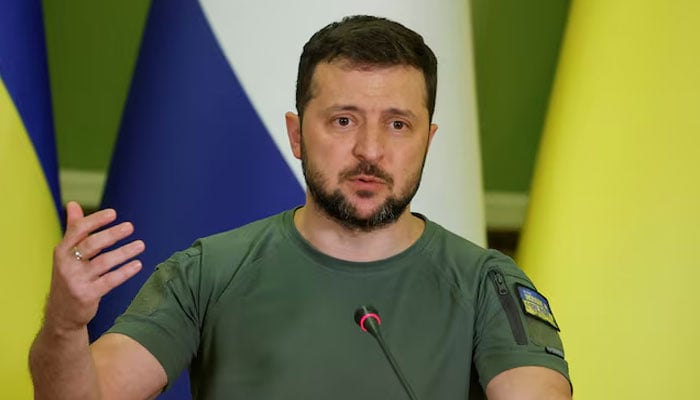
- Moscow reviewing 20-point plan but may not accept territorial terms.
- Plan allows partial troop withdrawals, establishment of demilitarised zones.
- Zelensky admits there are points in plan he does not fully agree with.
KYIV: Ukraine won some concessions in the latest version of a US-led draft plan to end the Russian invasion, revealed by President Volodymyr Zelensky, though key questions remain over territory and whether Moscow could accept the new terms.
The 20-point plan, agreed on by US and Ukrainian negotiators, was being reviewed by Moscow, but the Kremlin is unlikely to abandon its hardline territorial demands for full Ukrainian withdrawal from the east.
Zelensky conceded there are some points in the document that he does not like, but Kyiv has succeeded in removing immediate requirements for Ukraine to withdraw from the Donetsk region or that land seized by Moscow’s army would be recognised as Russian.
Nevertheless, the Ukrainian leader still indicated the proposal would pave the way for Kyiv to pull some troops back, including from the 20 percent of the Donetsk region that it controls, where demilitarised zones would be established.
It also got rid of demands that Kyiv must legally renounce its bid for Nato membership.
Zelensky presented the plan during a two-hour briefing with journalists, reading from a highlighted and annotated version.
“In the Donetsk, Lugansk, Zaporizhzhia, and Kherson regions, the line of troop deployment as of the date of this agreement is de facto recognised as the line of contact,” Zelensky said of the latest version.
“A working group will convene to determine the redeployment of forces necessary to end the conflict, as well as to define the parameters of potential future special economic zones,” he added.
This appears to suggest the plan opens the way for, but delays, options that Ukraine was previously reluctant to consider — a withdrawal of troops and the creation of demilitarised zones.
“We are in a situation where the Russians want us to withdraw from the Donetsk region, while the Americans are trying to find a way,” Zelensky said.
“They are looking for a demilitarised zone or a free economic zone, meaning a format that could satisfy both sides,” he continued.
Nato, land, nuclear plant
US President Trump is trying to broker an to end the four-year war, triggered by Russia’s 2022 invasion.
Tens of thousands have been killed, eastern Ukraine decimated, and millions forced to flee their homes.
Russian troops are advancing on the front and hammering cities and Ukraine’s energy grid with nightly missile and drone barrages. The defence ministry on Wednesday said it had captured another Ukrainian settlement in the southern Zaporizhzhia region.
Moscow in 2022 claimed to have annexed four Ukrainian regions — Donetsk, Kherson, Lugansk, and Zaporizhzhia — in addition to the Crimean peninsula, which it seized in 2014.
In Moscow, President Vladimir Putin has shown no willingness to compromise, doubling down on his hardline demands for a sweeping Ukrainian withdrawal and a string of political concessions that Kyiv and its European backers have previously cast as capitulation.
Any plan that involves Ukraine pulling back its troops would need to pass a referendum in Ukraine, Zelensky said.
“A free economic zone. If we are discussing this, then we need to go to a referendum,” Zelensky said, referring to plans to designate areas Ukraine pulls out from as a demilitarised free trade zone.
On Nato, Zelensky said: “It is the choice of Nato members whether to have Ukraine or not. Our choice has been made. We moved away from the proposed changes to the Constitution of Ukraine that would have prohibited Ukraine from joining Nato.”
Nevertheless, the prospects of Ukraine being admitted to the bloc appear slim-to-none, as it has been ruled out by Washington.
Moscow has repeatedly said Nato membership for Ukraine is unacceptable, presenting it as one of the reasons it invaded in the first place.
The plan sees joint US-Ukrainian-Russian management of the Zaporizhzhia nuclear power plant, occupied by Russian troops. Zelensky said he does not want any Russian oversight of the facility.
He also said Ukraine would hold presidential elections only after an agreement is signed — something both Putin and Trump have been pushing for.
Kremlin spokesman Dmitry Peskov told reporters Moscow was “formulating its position” and declined to comment on the specifics of the latest plan.
Russian officials have repeatedly criticised European and Ukrainian efforts to amend an original US plan that enshrined many of its demands.
Direct talks between Russian and Ukrainian negotiators earlier this year in Istanbul failed to break the deadlock and despite the flurry of diplomacy, the positions of the two countries appear to still be far apart.
Politics
Bangladesh political heavyweight Tarique Rahman to end exile
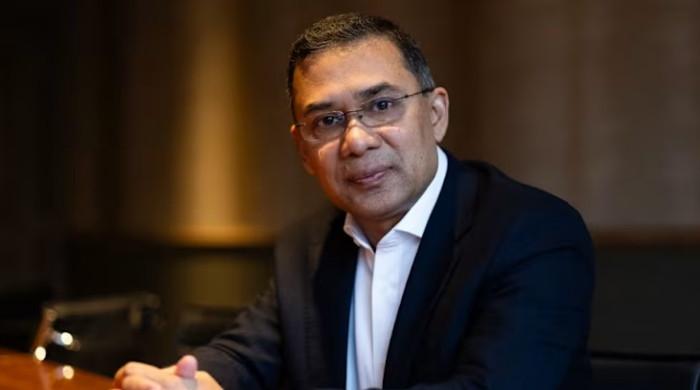

- Rahman serves as acting chairman of BNP.
- Political scion expected to take reins from Khaleda Zia.
- Rahman acquitted of most serious charge.
The heir to Bangladesh’s longtime ruling family and a leader of its most powerful political party, Tarique Rahman is set to return home after 17 years in exile and ahead of key elections.
Rahman, 60, an aspiring prime minister who has lived in London since he fled Bangladesh in 2008 over what he called a politically motivated persecution, is due to arrive in Dhaka on Thursday.
Acting chairman of the Bangladesh Nationalist Party (BNP), he is expected to take the reins from his ailing mother, 80-year-old former prime minister Khaleda Zia.
Despite years of ill health and imprisonment, Zia vowed in November to campaign in the February 12, 2026 elections.
But she was hospitalised soon after that pledge, and she has been in intensive care ever since.
The elections will be the first since a mass uprising last year ended the 15-year hardline rule of Sheikh Hasina, who was at odds with the BNP.
Since Hasina’s fall from power, Rahman has been acquitted of the most serious charge against him: a life sentence handed down in absentia for a 2004 grenade attack on a Hasina rally. He had denied the charges.
BNP secretary general Mirza Fakhrul Islam Alamgir has promised Rahman will “arrive among us on the soil of Dhaka” on December 25, which he said will be a “fantastic day.”
Rahman, often pictured beside his mother on BNP banners, has long been groomed for leadership.
In June, he met in London with Muhammad Yunus, the 85-year-old Nobel Peace Prize winner leading the interim government until the February elections.
Violent politics
Rahman, known in Bangladesh as Tarique Zia, carries a political name that has defined his life.
Born in 1967 when the country was still East Pakistan, he was briefly detained as a child during the 1971 war. The BNP hails him as “one of the youngest prisoners of war”.
His father, Ziaur Rahman, was an army commander.
Ziaur Rahman gained influence months after a 1975 coup in which Sheikh Hasina’s father — founding leader Sheikh Mujibur Rahman was murdered.
That fuelled lifelong tensions between the Zia and Hasina families, dubbed the “Battle of the Begums” — “begum” meaning a powerful woman.
Ziaur Rahman was assassinated when his son was 15.
The younger Rahman grew up in his mother’s political orbit, as Zia went on to become the country’s first female prime minister, alternating her terms in power with Hasina.
Rahman briefly studied international relations at Dhaka University before entering politics at 23, joining the BNP in its fight against military ruler Hussain Muhammad Ershad, according to his party.
‘Unnerves many’
Still, Rahmans’ career has been dogged by allegations of nepotism and mismanagement.
A 2006 US embassy cable described him as the BNP’s “heir apparent” who “inspires few but unnerves many”.
Other cables labelled him a “symbol of kleptocratic government and violent politics” and accused him of being “phenomenally corrupt” — claims he rejected as politically motivated.
Rahman was arrested on corruption charges in 2007 and claimed he was tortured in custody.
Reports suggested his release was conditional on leaving politics. Freed later that year, he flew to London in 2008 for medical treatment and never returned.
After Hasina swept to power in 2008, her government jailed tens of thousands of BNP members.
In 2018, Rahman was again sentenced in absentia to life imprisonment for allegedly orchestrating the 2004 attack on Hasina’s rally — a case the BNP called a bid to eliminate the Zia dynasty from politics.
In Britain, he kept a low profile alongside his wife, a cardiologist, and their daughter.
Since Hasina’s ouster, Rahman emerged as an outspoken figure on social media and a rallying point for BNP supporters.
-

 Fashion7 days ago
Fashion7 days agoIndonesia’s thrift surge fuels waste and textile industry woes
-

 Tech7 days ago
Tech7 days agoT-Mobile Business Internet and Phone Deals
-

 Business7 days ago
Business7 days agoBP names new boss as current CEO leaves after less than two years
-

 Sports7 days ago
Sports7 days agoPKF summons meeting after Pakistani player represents India in kabaddi tournament
-
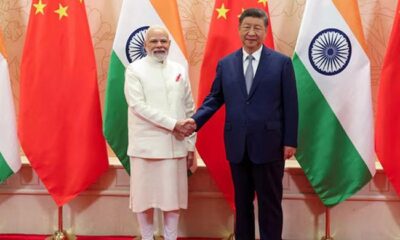
 Entertainment7 days ago
Entertainment7 days agoIndia streamlines visa rules in boost for Chinese professionals
-

 Sports7 days ago
Sports7 days agoUWCL grades for all 18 teams: Leuven get A+; Barça an A-, PSG fail
-
Sports5 days ago
Alabama turned Oklahoma’s College Football Playoff dream into a nightmare
-
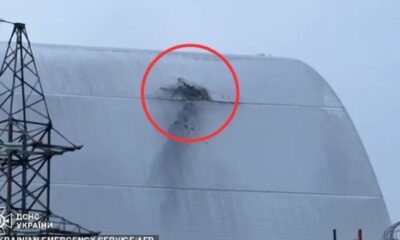
 Entertainment7 days ago
Entertainment7 days agoRadiation fears rise after cracks found in $2 billion Chernobyl shield






